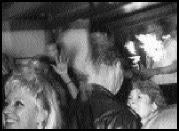ODD GIRL OUT: THE HIDDEN CULTURE OF AGGRESSION IN GIRLS
(Harcourt Brace, $25) various venues, see Books Calendar, p. 75, for information Tues., May 14-Thurs., May 16
ODD GIRL OUT, the first book from 27-year-old New Yorker Rachel Simmons, is a bold and myth-shattering work that challenges the notion of girls as the “sweeter” sex. Through interviews with girls, parents, and educators, Simmons takes on the widely held belief that “girls don’t bully” and turns it on its head, proposing a new framework for the understanding of female aggression.
Under immense pressure to be “nice,” Simmons argues, girls turn to so-called “alternative aggressions”—such as ostracism, exclusion, and the “silent treatment”—to express their anger without engaging in outright confrontation. Because “bullying” is typically conceived of as physical schoolyard aggression, female aggression is often overlooked by parents and ignored by teachers, many of whom regard such behaviors as a normal part of “growing up.” But although girl bullying can be subtle, even invisible, it often has profound impacts on victims’ confidence and self-esteem.
The notion was as groundbreaking as it was compelling, and it elicited an outpouring of responses from former victims and bullies alike. Since the publication of Odd Girl Out, Simmons has made the talk-show rounds and appeared on Oprah; two weeks ago, her book debuted at No. 10 on The New York Times best-seller list.
Seattle Weekly: What kind of revelations did the girls you spoke with have during the interview process?
Rachel Simmons: One of the biggest fears that girls have about direct conflict is that someone won’t be their friend anymore if they tell them how they’re really feeling. I think a lot of girls think they’re the only ones that feel that. And so when they see the other girls are feeling it, too, I think it’s really exciting for them, because so many of them feel really alone. There is a sense that this is just something that they deal with on their own.
Why are girls so terrified of isolation?
I think girls and women are expected to be caretakers. We are expected to be in relationships with other people. That’s how we get rewarded. That’s how we kind of earn our way as females. What makes you popular is having lots of friends; what makes you a valid woman is being a wife and a mother. We are rewarded for being in relationships with others, and so isolation is a violation of that and a failure to fulfill that responsibility that you’ve been given by the culture.
How are those expectations reinforced in school and popular culture?
I think firstly and most powerfully, at least for girls, is that the media represents girls as social creatures. They’re always pictured on the phone or surrounded by lots of friends. The research shows that girls are still socialized by parents and teachers to not be aggressive, to be nice to each other all the time, and you can’t be nice and be in conflict. The composite picture of a typical girl is not one who stands on her own two feet or is very assertive or is angry or is in conflict. So the messages are coming from the very beginning of socialization. Then I think those messages get kind of recycled and strengthened in the peer culture—that girls start to punish each other for being mean or for being overtly aggressive. They reward the girls who keep and who have as many friends as they can, even if those friendships are rife with indirect aggression.
Does “assertiveness training” help girls learn to be more aggressive?
I don’t think assertiveness training can be effective without paying attention to the aggression and friendship issues. What we really want girls to be able to do is to express that they’re feeling upset or angry with someone directly. It’s a lot harder for a girl to tell her friend why she’s upset than it is to punch a big padded marshmallow man in assertiveness class. And I think ultimately those are the hardest things a girl’s going to have to do.
What insights did you have into your own life and history when writing this book?
Writing this book totally changed my life. Through listening to all these girls talk about their fear of conflict and the way they hid their own anger, I realized how much I was doing the same thing, and I felt that it would be harder and harder for me to continue to repress my anger. So it really changed the way I conducted myself with my own friends, and it made me really come into contact with my own repression and my own need to be a “good girl.”
So what was going on Oprah like?
I had the best time. I did have a couple of moments of being like, holy shit, that’s Oprah Winfrey, but she’s a human being. I feel bad for celebrities. They treated her like Jesus Christ. She has all these women that are throwing themselves at her; they all want hugs and they’re touching her—it’s just creepy.







